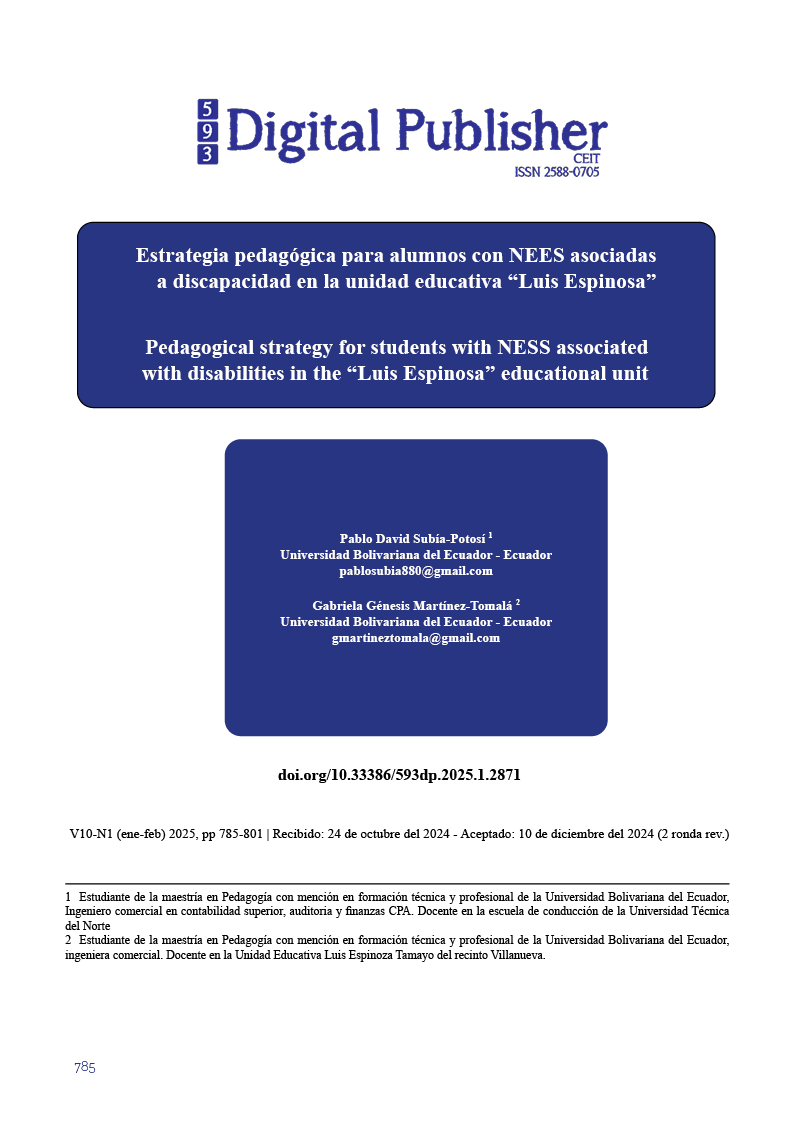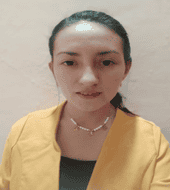Pedagogical strategy for students with NESS associated with disabilities in the “Luis Espinosa” educational unit
Main Article Content
Abstract
The research aims to design a pedagogical strategy for the teachers of the “Luis Espinosa” Educational Unit that allows improving the insertion of students with NESS associated with disability and the development of their competencies and skills based on the theories of Dewey, Vygotsky and Ausubel on the teaching-learning process. Applies action methodology in the classroom based on student identification, design of an intervention plan, implementation of the strategy and evaluation of the achievements achieved in the educational process. It uses action techniques in the classroom and combines qualitative and quantitative approaches, uses theoretical and empirical methods for the collection and analysis of information, follows a methodological route in three phases: diagnosis of the problem, modeling and validation of the proposal.
It concludes that the pedagogical strategy through the use of assistive technologies is vital for the development of competencies and skills of students with NESS, promoting inclusion and integration. The implementation of the pedagogical strategy in combination with the approaches of cited authors, is shown to be highly effective in students who have NESS associated with disability and in general with the development of the teaching-learning process of this segment of the student body, providing quality educational services based on the principles of justice and equality.
Downloads
Article Details

This work is licensed under a Creative Commons Attribution-NonCommercial-ShareAlike 4.0 International License.
1. Derechos de autor
Las obras que se publican en 593 Digital Publisher CEIT están sujetas a los siguientes términos:
1.1. 593 Digital Publisher CEIT, conserva los derechos patrimoniales (copyright) de las obras publicadas, favorece y permite la reutilización de las mismas bajo la licencia Licencia Creative Commons 4.0 de Reconocimiento-NoComercial-CompartirIgual 4.0, por lo cual se pueden copiar, usar, difundir, transmitir y exponer públicamente, siempre que:
1.1.a. Se cite la autoría y fuente original de su publicación (revista, editorial, URL).
1.1.b. No se usen para fines comerciales u onerosos.
1.1.c. Se mencione la existencia y especificaciones de esta licencia de uso.
References
Alulima, & et al. (2022). DIALNET. https://dialnet.unirioja.es/: https://dialnet.unirioja.es/servlet/articulo?codigo=8127263
Asamblea Nacional. (2019). Ley Orgánica de Discapacidades. Quito: Imprenta del Gobierno.
Asamblea Nacional del Ecuador. (2021). Constitución de la República del Ecuador. Quito: Imprenta del Gobierno.
Ausubel, D. (2009). Aprendizaje significativo. México: Trillas.
CEPAL. (05 de ABRIL de 2024). Obtenido de https://www.cepal.org/es/publicaciones/ps
Cook, A., & Miller, J. (2016). Tecnologías de asistencia. Dallas: Compense.
Delgado, K., & Romero, M. (2022). DSpace U. https://repositorio.uti.edu.ec/handle/123456789/2733
Dewey, J. (1946). The philosophy of the arts. Illinois: Siu press.
Díaz-Barriga, Á., & Miranda, A. (2014). Metodología de la investigación educativa. Tiaxcala: Ediciones Díaz de Santos.
Echeita, Gerardo;. (2004). Psicología Educativa. https://journals.copmadrid.org/psed/art/a2cc63e065705fe938a4dda49092966f
EDUCREA. (2022). EDUCREA. https://educrea.cl/: https://educrea.cl/estrategias-de-atencion-para-apoyar-a-alumnos-con-necesidades-educativas-especiales-en-el-aula/
García Rivas, N. E. (2024). Ciencia Látina. file:///C:/Users/HP%20AMD%20E2/Downloads/11228-Texto%20del%20art%C3%ADculo-57681-3-10-20240531.pdf
Gómez, N. (2013). Revista Científica Esteli. https://revistasnicaragua.cnu.edu.ni/index.php/RCientifica/article/view/7
González Dávila, A. (2021). IESPE. https://www.iespe.mx/: https://www.iespe.mx/post/observacion-de-aula-y-formacion-docente
Jonassen, D. (2006). Meaningful Learning with Technology. New York: Pearson.
Luque Parra, D. J. (2009). Revista Latinoamericana de Estudios Educativos (México). https://www.redalyc.org/pdf/270/27015078009.pdf
Mera, M., & Espín , A. (2019). Dialnet. https://dialnet.unirioja.es/servlet/articulo?codigo=7054919
Ministerio de Educación. (2013). Guía de trabajo. Adaptaciones curriculares para la educación especial e inclusiva. Quito: Manthra comunicaciones.
Ministerio de Educación. (2016). Instructivo para la evaluación y promoción de estudiantes con necesidades educativas eespeciales. Quito: Editora del Estado.
Ministerio de Educación del Ecuador. (2013). Guía de Trabajo para atender necesidades educativas especiales. Quito: Manthra Comunicación.
Ministerio de Educación y Cultura. (2011). Estrategias pedagógicas para atender las necesidades educativas especiales en la educación regular. Quito: Editorial Ecuador.
Monereo, & et al. (1999). Estrategias de enseñanza y aprendizaje . Barcelona: Editorial GRaó.
ONU. (2008). ONU. https://www.ohchr.org/: https://www.ohchr.org/sites/default/files/Documents/Publications/AdvocacyTool_sp.pdf
ONU. (2022). https://documents.un.org/doc/undoc/gen/n22/759/38/pdf/n2275938.pdf
OPOSINET. (2021). OPOSINET. https://www.oposinet.com/: https://www.oposinet.com/temario-pedagogia-terapeutica/temario-9-pedagogia-terapeutica/tema-7-los-recursos-materiales-y-personales-para-la-atencin-de-los-alumnos-y-de-las-alumnas-con-necesidades-educativas-especiales-recursos-de-la-escuela-recursos-extern
Pizarro, & et al. (2013). Redalyc. https://www.redalyc.org/: https://www.redalyc.org/pdf/679/67932397003.pdf
QLU. (2023). https://qlu.ac.pa/. Obtenido de https://qlu.ac.pa/estrategias-aprendizaje-y-ensenanza/
Tobón, S. (2006). Universidad Veracruzana. Obtenido de https://www.uv.mx/: https://www.uv.mx/rmipe/files/2019/07/Aspectos-basicos-de-la-formacion-basada-en-competencias.pdf
UNESCO. (2020). UNESCO. https://unesdoc.unesco.org/: https://unesdoc.unesco.org/ark:/48223/pf0000374447_spa
UNIR. (2024). https://ecuador.unir.net/. https://ecuador.unir.net/actualidad-unir/necesidades-educativas-especiales/
Vásquez , J., & Veloz, C. (05 de 05 de 2023). Ciencia látina. https://ciencialatina.org/: https://ciencialatina.org/index.php/cienciala/article/view/6230/9469
Vygotsky, L. (2012). El desarrollo de los procesos psicológicos superiores. Barcelona: Editorial austral.



